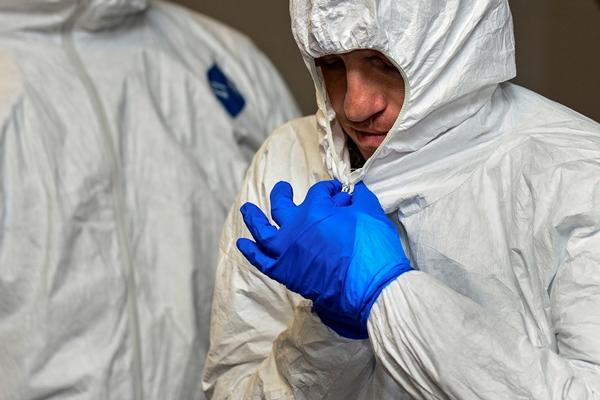The 30-person military rapid response team for domestic Ebola cases began specialized training Wednesday at Fort Sam Houston in Texas and should be ready to be sent anywhere in the U.S. next week, the Pentagon said.
The response team -- 20 critical care nurses, five doctors trained in infectious disease, and five trainers in infectious disease protocols - were receiving specialized training in infection control and the use of personal protective gear, said Army Col. Steve Warren, a Pentagon spokesman.
The specialized training from U.S. Army Medical Research Institute of Infectious Diseases (USAMRIID) should be completed this weekend and the unit would then be ready to deploy in an emergency, Warren said.
Last weekend, Defense Secretary Chuck Hagel ordered U.S. Northern Command, with responsibility for homeland defense, to form the team of specialists following the reports of three domestic cases of Ebola at Texas Health Presbyterian Hospital in Dallas.
Thomas Eric Duncan, a Liberian man, died of the disease on Oct. 8 and two nurses who treated him - Nina Pham and Amber Vinson - later contracted the virus.
In announcing formation of the rapid response team for domestic cases, Hagel joined the White House and the Centers of Disease Control in stressing that the only method of containment of Ebola was to treat the virus in West Africa, where Ebola has hit hardest in Liberia, Guinea and Sierra Leone.
The Pentagon said Wednesday that Maj. Gen. Gary Volesky, commander of the Army's 101st Airborne Division, had arrived in Liberia and was expected to take command of Operation United Assistance from Army Maj. Gen. Darryl Williams this weekend.
Williams was returning to his previous command at U.S. Army Africa after guiding the initial deployments of troops to West Africa.
Pentagon officials said there were now about 631 troops on the ground in West Africa - 514 in Liberia and the rest in Senegal which is serving as an Intermediate Staging Base for the movement of supplies and personnel into the region. About 240 more troops were expected to arrive "in the coming days," Warren said.
The Pentagon also gave a rough breakdown on the troops by service. In Liberia, there were about 208 from the Army, 108 from the Air Force, 43 from the Navy, 95 from the Marine Corps and 33 Defense Department civilians.
In Senegal, there were 17 from the Army, 85 from the Air Force, one from the Navy, one from the Marine Corps and 13 civilians.
-- Richard Sisk can be reached at Richard.Sisk@military.com































